On the first day of the meeting, participants all joined a farm tour to visit two local AMAP[1] farms in the surroundings of Marseilles that feed AMAP members from the city:
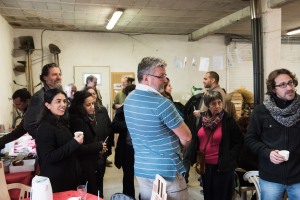 This is where Jérôme started growing strawberries with his father back in 1991. In the spring of 1998, he lost 90% of his crop and decided to go organic and change his marketing strategy. After he had been working the soil using natural amendments and systems of pest control for a year, his father said that the soil had strated to smell like it used to when he was young, and had regained the lovely colour he had always known as a child. He became a pioneer of the AMAP movement, and was one of the first AMAPs created in the Provence region in 2001. Since then, he’s been an enthusiast and inspiring advocate for the AMAP model and movement, mentoring many young farmers and being part of the AMAP networks. He’s now a successful fruit and vegetable grower with a 6-hectare farm (almost 15 acres); he has 8 seasonal workers in the summer and 3 permanent people who work year round on the farm.
This is where Jérôme started growing strawberries with his father back in 1991. In the spring of 1998, he lost 90% of his crop and decided to go organic and change his marketing strategy. After he had been working the soil using natural amendments and systems of pest control for a year, his father said that the soil had strated to smell like it used to when he was young, and had regained the lovely colour he had always known as a child. He became a pioneer of the AMAP movement, and was one of the first AMAPs created in the Provence region in 2001. Since then, he’s been an enthusiast and inspiring advocate for the AMAP model and movement, mentoring many young farmers and being part of the AMAP networks. He’s now a successful fruit and vegetable grower with a 6-hectare farm (almost 15 acres); he has 8 seasonal workers in the summer and 3 permanent people who work year round on the farm.
The main specificity of AMAP production is the variety: Jérôme grows 60 to 70 plant species and more than 110 cultivated varieties! His son has now started farming too, and has created a specific AMAP for young people, mainly students. The objective is to provide them with affordable, nutritious food in baskets whose size is adapted to their specific needs.
We spent the whole morning on his farm visiting and discussing how he works, and had lunch there, made of produce from his farm. As a dessert, we tried the experimental sorbet ice-creams he is starting to make: lemon, mint and beetroot!

Marie-Hélène Di Ruzza and her partner Samuel are new farmers who now grow organic vegetables and produce eggs in La Destrousse where their small farm was established in 2011 with the support of the community (and their mentor Jérôme!). They naturally chose the AMAP model, and also have farm-gate sales as well as selling at farmers’ markets. We had interesting discussions on how difficult it is to start farming when you are new to it, and how the support of the community (AMAP members, exeprienced farmers, municiaplity) is vital for newcomers to settle successfully on the land (and also what huge amounts of work are involved).
Evening at l’Equitable café, community café
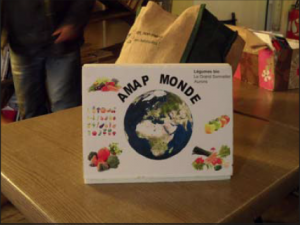
This café is the delivery point for AMAP-Monde. Every Monday, from 6 to 8pm, AMAP members come and prepare their weekly baskets before taking them home!
While the distribution was going on, we gathered for an aperitif. Everyone was invited to give feedback about what he/she thought about the farm visits.
There was much informal disc
ussions before the presentation by a PhD candidate, Victorien Barbet (GREQAM, Aix-Marseille) of an overview on his findings about success factors for AMAP. His current investigations aim to create socio-economic indicators to evaluate Short food supply chains and local agriculture.
[1] AMAP= Association pour le Maintien de l’Agriculture Paysanne, French CSAs.
On the second and third days, we had fruitful working sessions, using several times the world café methodology. After refining our objectives and what kind of partnerships we want to foster between farmers and consumers, we started a first collective reflection on how best to create and develop a future Mediterranean Basin network of LSPs.
You can read the extensive minutes of the meeting to have a taste of our lively discussions.
The current plan is to start building a strategic plan for the future, and the key question is how to develop a common project?
- What common goal?
- What do we need to achieve this goal?
We started with the same three fundamentals we had first identified: Agroecology, solidarity between producers and consumers, Food Sovereignty but we finally came to slightly different conclusions:
- COMMITTED ACTORS
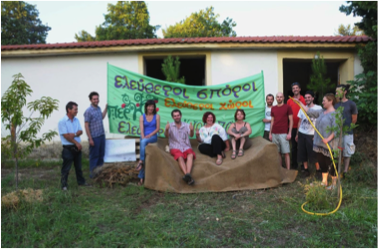
- Experience sharing on producer-consumer relationships/risk sharing (moving towards CSA)
- Improving farmers’ and consumers’ livelihoods and living conditions
- Right to Food!
- Communication / Advocacy
> GOALS:
- Experience-sharing trips (“learning journeys”) to make these partnerships live/ grow, to reinforce them
- More practical training sessions on specific topics
- Online knowledge-sharing
- Motivating actors
>> HOW TO ACHIEVE THESE GOALS:
- Facebook page to keep in touch (this requires a moderator)
- Clear document / Common Ground Charter, explaining who we are
- Video to disseminate knowledge (about some specific projects)
- Training on how to capture and carry the farmers’ voice
- Media Kit: One-pager
- Train ambassadors / catalysts
2. A GOOD PLOT OF LAND
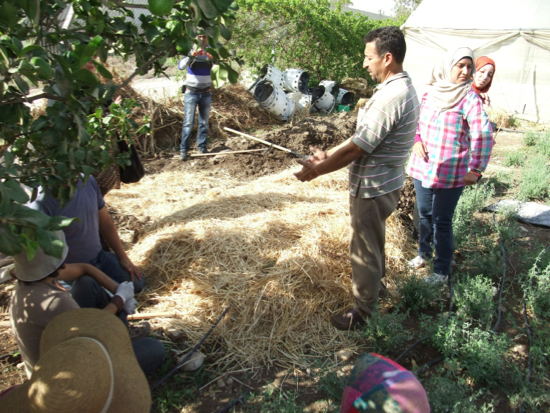
- Agroecology training program: farmer-to-farmer mentoring
- Incubators / Experimental centres (for farmers and/or community gardening, also a place to welcome refugees)
- Unpolluted resources (issues of polluted water and land, no GMOs)
- Access to land, energy and water
> GOALS
- Interconnected farms/ agroecological gardens in different regions
- One educational farm in each country
- Access to land, clean resources
- Building seed networks
- Popular Education
>> HOW TO ACHIEVE THE GOALS
- Needs assessments (not for the whole country, but for the initiatives we work with in each country) → template + assessment from each country
- List serve
- Facebook page
- Investigate legalities of land issues (later)
- Work with the Land, Seeds & Water Coalition
- Build local seed networks / alliances with seed networks
- Skill-sharing database
- Advocacy
3. FOSTERING TRUST 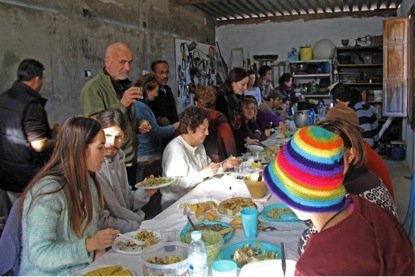
- Local solidarity between farmers and consumers (including refugees and IDPs at our local level)
- International solidarity between movements and initiatives
- Alliances with other actors / movements around the Mediterranean Basin
- Common values / Standards/ Declaration
- Holistic approach
> GOALS
- Trust between farmers and consumers
- Trust between one another
- Trust between us and government at State and/or local level
- Closer relationships
- We need more meetings like this one
- Trust vs Control
- Common views / goals → Declaration (good idea but cannot be done now, this requires a deeper work for our group)
>> HOW TO ACHIEVE THESE GOALS
- Press Release
- Database/ places for exchange, knowledge-sharing, both virtual and physical
- Database between all of us in which we can pool all resources/ contacts
- Find catalysts in each country that can facilitate the relationship between producers and consumers; they could also be economists, researchers, agronomists…
- We need to choose a lingua franca (English?) or continue using interpretation which is more difficult but may be necessary
- Create a “Mediterranean common folder” where to share our documents
